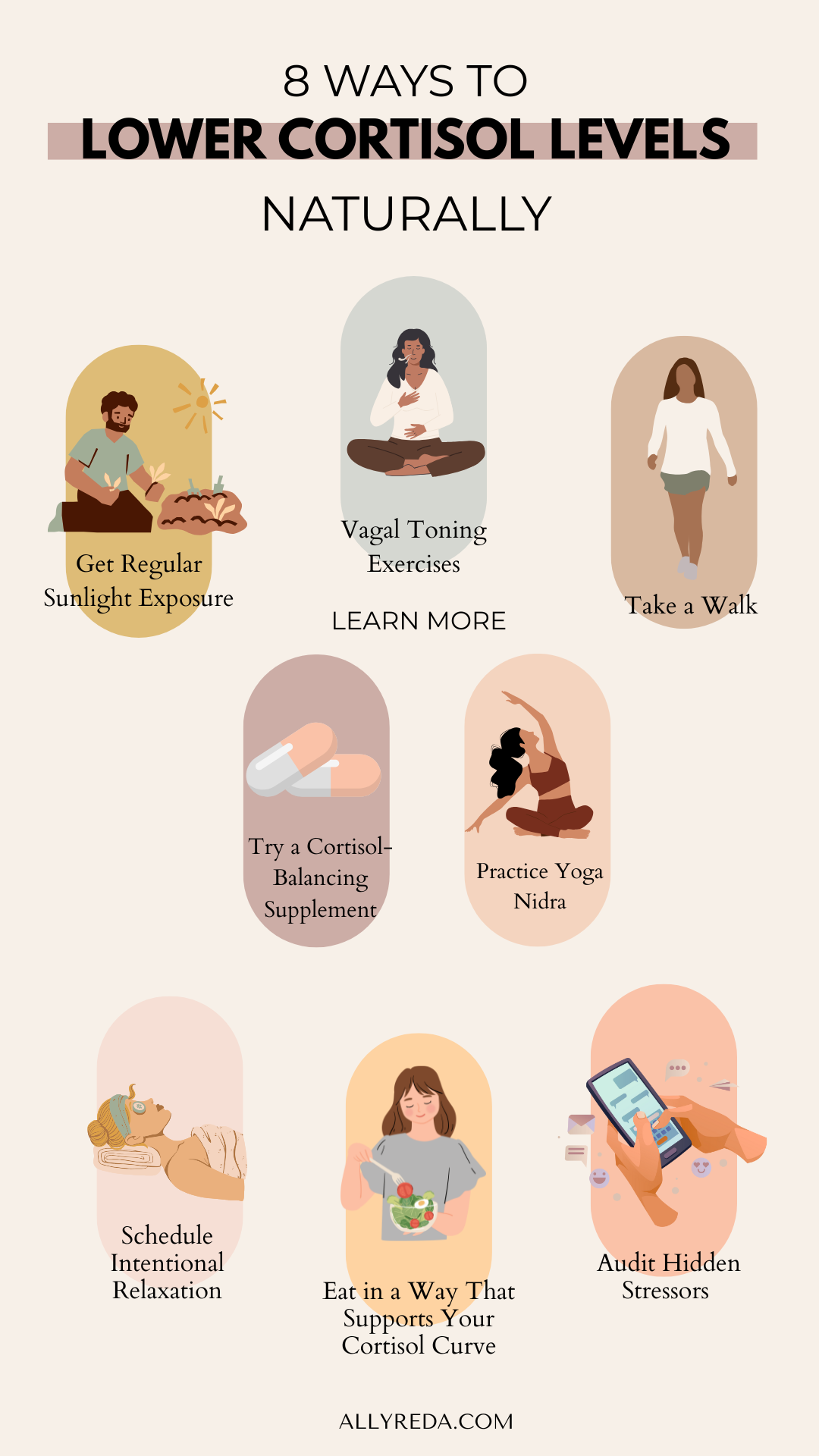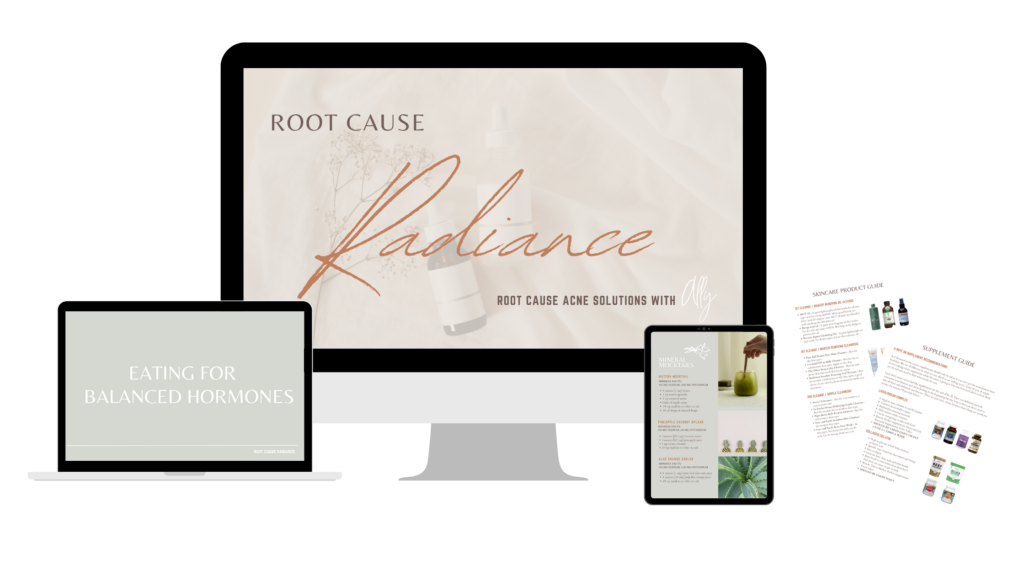The Blog
8 Ways To Lower Cortisol Levels Naturally

If your skin’s flaring up, your sleep is a mess, and you feel like you’ve got a mini tire inflating around your waist (hello, cortisol belly), it’s probably not your willpower that’s failing—it’s your stress hormones.
Cortisol is your body’s main stress hormone. It can be helpful in short bursts—but when it’s chronically high, it messes with everything: your skin, your gut, your hormones, your sleep, and yes… your mood.
So today, we’re diving into 8 powerful ways to lower cortisol levels naturally—all rooted in my favorite tools from the Heal Your Nervous System lesson inside Root Cause Radiance.
You Deserve Calm—Without Burning Out or Pushing Harder
Lowering cortisol isn’t about doing more—it’s about doing the right things to support your nervous system and hormones. Inside this course, you’ll learn exactly how to reduce stress at the root with our proven 4-pillar method for clearer skin, balanced hormones, and a body that actually feels good to live in.

1. Get Regular Sunlight Exposure
Here’s the deal: your brain needs light signals to know what time it is. Morning sunlight is the most natural and effective way to regulate your circadian rhythm, and that rhythm controls cortisol.
- Step outside within 30–60 minutes of waking up. No sunglasses, no windows—just your eyeballs and the sky.
- Aim for 3–5 minutes at sunrise and 20 minutes of midday sun (UVA rise) daily.
This single habit helps lower cortisol naturally in the evening, supports melatonin production, and helps your body actually relax when it’s supposed to.
Bonus: This habit alone can improve your sleep, energy, and mood in less than a week.
2. Vagal Toning Exercises
Reducing cortisol levels starts with calming your nervous system. One of the fastest ways? Activating your vagus nerve.
Here are some easy ways to do it:
- Diaphragmatic breathing (deep belly breathing with a slow exhale)
- Box breathing (inhale 4 – hold 4 – exhale 4 – hold 4)
- Gargling or humming for 30 seconds
- Neck and ear massage (gently rub behind the ears and down the neck)
- Lateral eye stretches (look left, then right without moving your head. Hold for 30 seconds)
Even 5 minutes a day can start to pull you out of fight-or-flight and help your body shift into rest-and-digest.
3. Take a Walk
Nothing fancy here. Just…walk.
Walking lowers cortisol, balances blood sugar, improves digestion, and boosts lymphatic flow.
- Go outside if possible (double win for that light exposure!)
- No phone, no pressure—just movement.
I aim for one or two short walks a day, especially after meals. This is the simplest cortisol reduction diet “hack” that doesn’t feel like a hack.
4. Practice Yoga Nidra
If meditation feels hard, try Yoga Nidra. It’s guided relaxation that walks your body through complete rest while your mind stays alert.
Studies show it can significantly lower high cortisol levels and improve sleep quality, especially if you’re wired but tired at night.
Tip: Try a free Yoga Nidra session on YouTube before bed. Even 10 minutes works wonders.
5. Try a Cortisol-Balancing Supplement
Some people need a little extra support, like Cortisol-balancing supplements, and that’s okay.
Look for:
- Adaptogens like rhodiola, reishi, or holy basil
- B vitamins to support adrenal function
- Magnesium (especially glycinate or malate)
- Nootropics to support healthy cortisol levels
These support the body’s ability to manage stress without crashing your system. Just make sure you pick quality brands and always check that they’re acne-friendly.
6. Schedule Intentional Relaxation (Yes, on Purpose)
I know—it’s “just a bath,” but intentional relaxation can change your stress response. We don’t need to earn rest. We just need to take it.
Here are my go-to reset rituals:
- Magnesium or Epsom salt bath (great for sore muscles and sleep)
- Legs up the wall pose for 5–10 mins (total nervous system reset)
- Read a real book instead of scrolling
- Journal, knit, cuddle your dog—whatever brings you peace.
7. Eat in a Way That Supports Your Cortisol Curve
Cortisol and blood sugar go hand-in-hand. So the way you eat matters—a lot.
Try this:
- Eat within 60 minutes of waking
- Prioritize protein, fat, and fiber at every meal
- Avoid skipping meals (this spikes cortisol big time)
- Reduce caffeine, especially on an empty stomach
Healing your stress hormones is just as much about how and when you eat as it is what you eat.
8. Audit Hidden Stressors
If you’re doing all the things but still feel anxious or overstimulated, take a moment to look at what’s draining you:
- News + social media
- Negative self-talk
- Overexercising
- Hustle mindset
- Toxic relationships
- Lack of boundaries
Awareness is the first step. You don’t have to overhaul everything overnight—just pick one area to start creating space and peace.
Your Cortisol Reset Game Plan
Start small. Pick 2 of these practices to focus on this week. Once they feel second nature, layer in one more.
You don’t need a 10-step morning routine or a week-long retreat in Bali (though that sounds amazing). You just need consistent calm, and your body will meet you there.
Want step-by-step help healing your hormones and calming inflammation at the root?
Check out my course Root Cause Radiance, where I walk you through a proven 4-pillar approach to acne and hormone healing, including nervous system support like this.
You can feel calm in your body again. And your skin will thank you for it.
Rooting for you always,
Ally
Be the first to comment